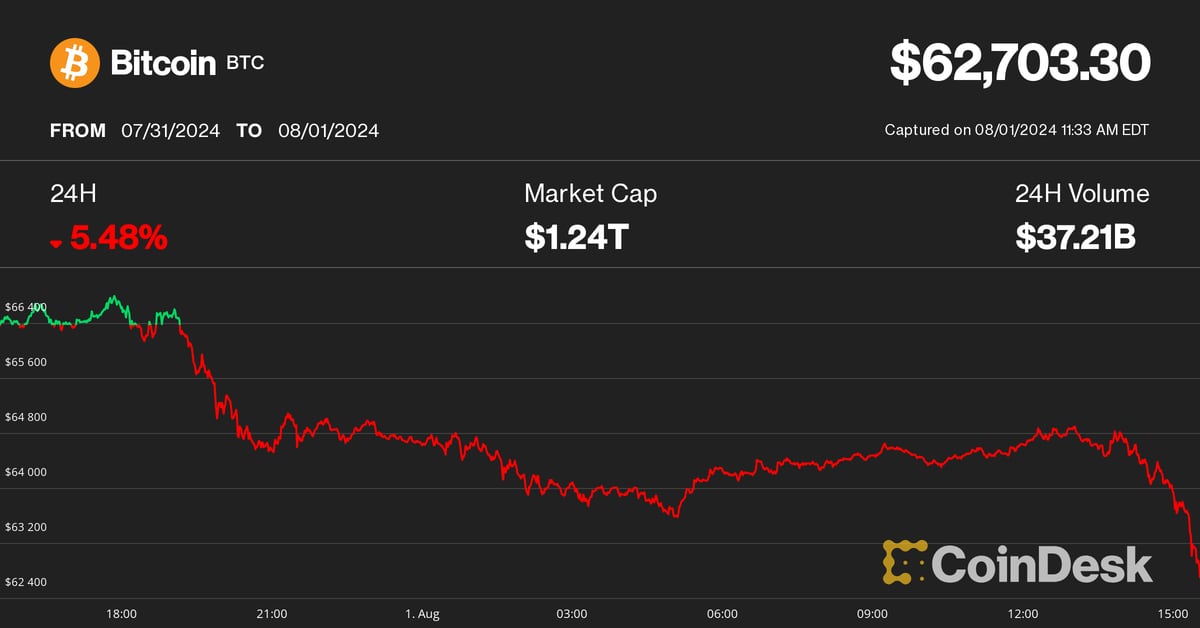Blockchain
US Treasury Issues 2025 Cryptocurrency Tax Rule, Delay Rules for Non-File Holders
The U.S. Treasury Department has issued a long-awaited tax regime for cryptocurrency transactions, setting filing rules for digital asset brokers that will begin with transactions made next year, but it has delayed some of its most controversial decisions on brokers who never take possession of clients’ crypto.
New Internal Revenue Service (IRS) rules for cryptocurrency brokers released Friday require trading platforms, hosted wallet services, and digital asset kiosks to provide information about the movements and earnings of customers’ assets. Those assets will also include, in very limited circumstances, stablecoins like Tether’s (USDT) and Circle Internet Financial (USDC) and high-value non-fungible tokens (NFTs), although the IRS explicitly refuses to resolve the long-standing battle over whether tokens should be considered securities or commodities.
While the rule focuses on the more obvious platforms like Coinbase Inc. (COIN) and Kraken, non-custodial crypto businesses like decentralized exchanges and unhosted wallet providers are only getting temporary respite from new storage requirements. Popular crypto platforms that handle a “substantial majority” of transactions can no longer wait for the rules, the agency argued, but the other issues require further study and will have their own rule “by the end of the year.”
“The Treasury Department and the IRS do not agree that non-custodial participants should not be treated as brokers,” according to explanations included in Friday’s rule. “However, the Treasury Department and the IRS would benefit from further consideration of issues involving non-custodial sector participants.”
The final rule for most commonly used brokers begins with transactions on January 1, 2025, leaving crypto taxpayers with another year of filing to calculate their 2024 returns themselves in the meantime, though cryptocurrency firms have already moved to adapt. The IRS has given brokers an additional year until 2026 to begin tracking the “cost basis” for assets, or the amount each was originally purchased for.
Real estate transactions paid for with cryptocurrency after January 1, 2026, will also have to be reported, the regulation says. “Real estate reporting persons” will have to report the fair market value of the digital assets used in any such transactions.
A 2021 infrastructure bill introduced in Congress had laid the groundwork for the Treasury IRS to establish this formal approach to cryptocurrencies, and the industry has since been frustrated by a continually delayed process. The eventual proposal attracted 44,000 public comments.
“Thanks to the bipartisan Infrastructure Investment and Jobs Act, digital asset investors and the IRS will have better access to the documentation they need to easily file and review their taxes.
“returns,” Aviva Aron-Dine, acting assistant secretary for fiscal policy, said in a statement. “By implementing the law’s reporting requirements, these final regulations will help taxpayers more easily pay taxes owed under current law, while reducing tax evasion by wealthy investors.”
IRS Commissioner Danny Werfel said the final rule took public comments into account.
“These regulations are an important part of the broader tax compliance effort for high-income earners. We need to ensure that digital assets are not being used to hide taxable income, and these final regulations will improve compliance detection in the high-risk digital asset space,” he said. “Our research and experience demonstrate that third-party reporting improves compliance. Additionally, these regulations will provide taxpayers with much-needed information that will reduce the burden and simplify the process of reporting their digital asset activity.”
The process of writing this controversial tax rule was provocative widespread concern from the sector where the U.S. government would go overboard by imposing impossible requirements on miners, online forums, software developers and other entities that help investors but that would not traditionally be considered brokers and do not have the customer information or disclosure infrastructure that would allow them to comply.
The IRS said it recognizes that cryptocurrency brokers should not include those “who provide validation services without providing other functions or services, or persons who are solely engaged in the business of selling certain hardware or licensing certain software, whose sole function is to allow people to control the private keys used to access digital assets on a distributed ledger.”
U.S. tax regulators estimate that about 15 million people will be affected by the new rule and about 5,000 businesses will have to comply.
The IRS said it sought to avoid some burdens for stablecoin users, especially when they are used to buy other tokens and in payments. In practice, a typical cryptocurrency investor and user who earns no more than $10,000 in stablecoins in a year is exempt from reporting. Stablecoin sales, the most common in cryptocurrency markets, will be counted collectively in an “aggregate” report rather than as individual transactions, the agency said, although sophisticated, high-volume stablecoin investors will not qualify.
The agency said that these tokens “unequivocally fall within the legal definition of digital assets as they are digital representations of the value of fiat currency recorded on cryptographically protected distributed ledgers,” so they cannot be exempt despite their goal of achieving this. a constant value. The IRS also said that completely ignoring such transactions would “eliminate a source of information about digital asset transactions that the IRS can use to ensure compliance with taxpayer reporting obligations.”
But the IRS added that if Congress passes one of its bills that would regulate stablecoin issuers, the tax rules may need to be revised.
The tax agency also faced complex legal arguments in determining how to handle NFTs, according to its extensive notes on that topic, and the agency decided that only taxpayers who earn more than $600 in a year from their sales NFTs require their aggregate proceeds to be reported to the agency. government. The resulting documentation will include taxpayers’ identifying information, how many NFTs were sold, and what the profits were.
“The IRS intends to monitor NFTs reported under this optional aggregate reporting method to determine whether this reporting hinders its tax enforcement efforts,” according to the text of the rule. “If abuse is found, the IRS will reconsider these special reporting rules for NFTs.”
As part of its efforts, the IRS released its definition of digital assets and the various activities covered by the legislation on Friday.
The IRS has also established a safe harbor for certain reporting requirements “that taxpayers can rely on to allocate the unused digital asset base to digital assets held in each taxpayer’s wallet or account as of January 1, 2025,” he has declared.
Earlier this year, the US tax agency had released a proposed Form 1099-DA to track cryptocurrency transactions, the form that millions of cryptocurrency investors would receive from their brokers.
The IRS made clear Friday that any attempt in this rule to assign buckets to cryptocurrencies is not intended to strengthen a side in the industry’s ongoing battle with regulators, particularly the U.S. Securities and Exchange Commission (SEC), over whether tokens are securities or commodities. That debate is now raging in several cases before federal judges, and while the SEC is willing to admit only bitcoin (BTC) is definitely out of the agency’s reach, Commodity Futures Trading Commission Chairman Rostin Behnam said that Ethereum’s ether (ETH) it’s also a commodity.
Such a position “is beyond the scope of these final regulations,” the IRS explained.
Nikhilesh De contributed reporting.
Blockchain
Bitcoin (BTC) Price Crashes as Donald Trump’s Win Odds Dip

Markets received nominally good news on Thursday morning, with the US ISM manufacturing PMI for July falling much more than economists expected, sending interest rates to multi-month lows across the board. Additionally, initial jobless claims in the US jumped to their highest level in about a year. Taken together, the data adds to the sentiment that the US is on the verge of a cycle of monetary easing by the Federal Reserve, which is typically seen as bullish for risk assets, including bitcoin.
Blockchain
Terra Blockchain Reboots After Reentry Attack Leads to $4M Exploit

Please note that our Privacy Policy, terms of use, cookiesAND do not sell my personal information has been updated.
CoinDesk is a awarded press agency that deals with the cryptocurrency sector. Its journalists respect a rigorous set of editorial policiesIn November 2023, CoinDesk has been acquired from the Bullish group, owner of Bullisha regulated digital asset exchange. Bullish Group is majority owned by Block.one; both companies have interests in a variety of blockchain and digital asset businesses and significant digital asset holdings, including bitcoin. CoinDesk operates as an independent subsidiary with an editorial board to protect journalistic independence. CoinDesk employees, including journalists, are eligible to receive options in the Bullish group as part of their compensation.
Blockchain
$6.8M Stolen, ASTRO Collapses 60%

In the latest news in the blockchain industry, there has been a turn of events that has severely affected Terra and its users and investors, with the company losing $6.8 million. The attack, which exploited a reentry vulnerability in the network’s IBC hooks, raises questions about the security measures of the once celebrated blockchain protocol.
A web3 security company, Cyvers Alerts reported that the exploit occurred on July 31st and caused the company to lose 60 million ASTRO, 3.5 million USDC500,000 USDTand 2. 7 BitcoinThe flaw was discovered in April and allows cybercriminals to make payments non-stop by withdrawing money from the network.
Earth’s response
Subsequently, to the hack employed on the Terra blockchain, its official X platform declared the Suspension network operations for a few hours to apply the emergency measure. Finally in its sendTerra’s official account agreed, sharing that its operations are back online: the core transactions that make up the platform are now possible again.
However, the overall value of the various assets lost in the event was unclear.
Market Impact: ASTRO Crashes!
The hack had an immediate impact on the price of ASTRO, which dropped nearly 60% to $0.0206 following the network shutdown. This sharp decline highlights the vulnerability of token prices to security breaches and the resulting market volatility.
This incident is not the first time Terra has faced serious challenges. Earlier this year, the blockchain encountered significant problems that called into question its long-term viability. These repeated incidents underscore the need for stronger security measures to protect users’ assets and maintain trust in the network.
The recent Terra hack serves as a stark reminder of the ongoing security challenges in the blockchain space. As the platform works to regain stability, the broader crypto community will be watching closely.
Read also: Record Cryptocurrency Theft: Over $1 Billion Stolen in 2024
This is a major setback for Terra. How do you think this will impact the blockchain industry?
Blockchain
Luxembourg proposes updates to blockchain laws | Insights and resources

On July 24, 2024, the Ministry of Finance proposed Blockchain Bill IVwhich will provide greater flexibility and legal certainty for issuers using Distributed Ledger Technology (DLT). The bill will update three of Luxembourg’s financial laws, the Law of 6 April 2013 on dematerialised securitiesTHE Law of 5 April 1993 on the financial sector and the Law of 23 December 1998 establishing a financial sector supervisory commissionThis bill includes the additional option of a supervisory agent role and the inclusion of equity securities in dematerialized form.
DLT and Luxembourg
DLT is increasingly used in the financial and fund management sector in Luxembourg, offering numerous benefits and transforming various aspects of the industry.
Here are some examples:
- Digital Bonds: Luxembourg has seen multiple digital bond issuances via DLT. For example, the European Investment Bank has issued bonds that are registered, transferred and stored via DLT processes. These bonds are governed by Luxembourg law and registered on proprietary DLT platforms.
- Fund Administration: DLT can streamline fund administration processes, offering new opportunities and efficiencies for intermediaries, and can do the following:
- Automate capital calls and distributions using smart contracts,
- Simplify audits and ensure reporting accuracy through transparent and immutable transaction records.
- Warranty Management: Luxembourg-based DLT platforms allow clients to swap ownership of baskets of securities between different collateral pools at precise times.
- Tokenization: DLT is used to tokenize various assets, including real estate and luxury goods, by representing them in a tokenized and fractionalized format on the blockchain. This process can improve the liquidity and accessibility of traditionally illiquid assets.
- Tokenization of investment funds: DLT is being explored for the tokenization of investment funds, which can streamline the supply chain, reduce costs, and enable faster transactions. DLT can automate various elements of the supply chain, reducing the need for reconciliations between entities such as custodians, administrators, and investment managers.
- Issuance, settlement and payment platforms:Market participants are developing trusted networks using DLT technology to serve as a single source of shared truth among participants in financial instrument investment ecosystems.
- Legal framework: Luxembourg has adapted its legal framework to accommodate DLT, recognising the validity and enforceability of DLT-based financial instruments. This includes the following:
- Allow the use of DLT for the issuance of dematerialized securities,
- Recognize DLT for the circulation of securities,
- Enabling financial collateral arrangements on DLT financial instruments.
- Regulatory compliance: DLT can improve transparency in fund share ownership and regulatory compliance, providing fund managers with new opportunities for liquidity management and operational efficiency.
- Financial inclusion: By leveraging DLT, Luxembourg aims to promote greater financial inclusion and participation, potentially creating a more diverse and resilient financial system.
- Governance and ethics:The implementation of DLT can promote higher standards of governance and ethics, contributing to a more sustainable and responsible financial sector.
Luxembourg’s approach to DLT in finance and fund management is characterised by a principle of technology neutrality, recognising that innovative processes and technologies can contribute to improving financial services. This is exemplified by its commitment to creating a compatible legal and regulatory framework.
Short story
Luxembourg has already enacted three major blockchain-related laws, often referred to as Blockchain I, II and III.
Blockchain Law I (2019): This law, passed on March 1, 2019, was one of the first in the EU to recognize blockchain as equivalent to traditional transactions. It allowed the use of DLT for account registration, transfer, and materialization of securities.
Blockchain Law II (2021): Enacted on 22 January 2021, this law strengthened the Luxembourg legal framework on dematerialised securities. It recognised the possibility of using secure electronic registration mechanisms to issue such securities and expanded access for all credit institutions and investment firms.
Blockchain Act III (2023): Also known as Bill 8055, this is the most recent law in the blockchain field and was passed on March 14, 2023. This law has integrated the Luxembourg DLT framework in the following way:
- Update of the Act of 5 August 2005 on provisions relating to financial collateral to enable the use of electronic DLT as collateral on financial instruments registered in securities accounts,
- Implementation of EU Regulation 2022/858 on a pilot scheme for DLT-based market infrastructures (DLT Pilot Regulation),
- Redefining the notion of financial instruments in Law of 5 April 1993 on the financial sector and the Law of 30 May 2018 on financial instruments markets to align with the corresponding European regulations, including MiFID.
The Blockchain III Act strengthened the collateral rules for digital assets and aimed to increase legal certainty by allowing securities accounts on DLT to be pledged, while maintaining the efficient system of the 2005 Act on Financial Collateral Arrangements.
With the Blockchain IV bill, Luxembourg will build on the foundations laid by previous Blockchain laws and aims to consolidate Luxembourg’s position as a leading hub for financial innovation in Europe.
Blockchain Bill IV
The key provisions of the Blockchain IV bill include the following:
- Expanded scope: The bill expands the Luxembourg DLT legal framework to include equity securities in addition to debt securities. This expansion will allow the fund industry and transfer agents to use DLT to manage registers of shares and units, as well as to process fund shares.
- New role of the control agent: The bill introduces the role of a control agent as an alternative to the central account custodian for the issuance of dematerialised securities via DLT. This control agent can be an EU investment firm or a credit institution chosen by the issuer. This new role does not replace the current central account custodian, but, like all other roles, it must be notified to the Commission de Surveillance du Secteur Financier (CSSF), which is designated as the competent supervisory authority. The notification must be submitted two months after the control agent starts its activities.
- Responsibilities of the control agent: The control agent will manage the securities issuance account, verify the consistency between the securities issued and those registered on the DLT network, and supervise the chain of custody of the securities at the account holder and investor level.
- Simplified payment processesThe bill allows issuers to meet payment obligations under securities (such as interest, dividends or repayments) as soon as they have paid the relevant amounts to the paying agent, settlement agent or central account custodian.
- Simplified issuance and reconciliationThe bill simplifies the process of issuing, holding and reconciling dematerialized securities through DLT, eliminating the need for a central custodian to have a second level of custody and allowing securities to be credited directly to the accounts of investors or their delegates.
- Smart Contract Integration:The new processes can be executed using smart contracts with the assistance of the control agent, potentially increasing efficiency and reducing intermediation.
These changes are expected to bring several benefits to the Luxembourg financial sector, including:
- Fund Operations: Greater efficiency and reduced costs by leveraging DLT for the issuance and transfer of fund shares.
- Financial transactions: Greater transparency and security.
- Transparency of the regulatory environment: Increased attractiveness and competitiveness of the Luxembourg financial centre through greater legal clarity and flexibility for issuers and investors using DLT.
- Smart Contracts: Potential for automation of contractual terms, reduction of intermediaries and improvement of transaction traceability through smart contracts.
Blockchain Bill IV is part of Luxembourg’s ongoing strategy to develop a strong digital ecosystem as part of its economy and maintain its status as a leading hub for financial innovation. Luxembourg is positioning itself at the forefront of Europe’s growing digital financial landscape by constantly updating its regulatory framework.
Local regulations, such as Luxembourg law, complement European regulations by providing a more specific legal framework, adapted to local specificities. These local laws, together with European initiatives, aim to improve both the use and the security of projects involving new technologies. They help establish clear standards and promote consumer trust, while promoting innovation and ensuring better protection against potential risks associated with these emerging technologies. Check out our latest posts on these topics and, for more information on this law, blockchain technology and the tokenization mechanism, do not hesitate to contact us.
We are available to discuss any project related to digital finance, cryptocurrencies and disruptive technologies.
This informational piece, which may be considered advertising under the ethics rules of some jurisdictions, is provided with the understanding that it does not constitute the rendering of legal or other professional advice by Goodwin or its attorneys. Past results do not guarantee a similar outcome.
-

 Regulation7 months ago
Regulation7 months agoRipple CTO and Cardano founder clash over XRP’s regulatory challenges ⋆ ZyCrypto
-

 Regulation5 months ago
Regulation5 months agoNancy Pelosi Considers Supporting Republican Crypto Bill FIT21 – London Business News
-

 Videos6 months ago
Videos6 months agoCryptocurrency News: Bitcoin, ETH ETF, AI Crypto Rally, AKT, TON & MORE!!
-

 Regulation6 months ago
Regulation6 months agoBitcoin’s future is ‘bleak’ and ripe for regulation, says lead developer
-

 News6 months ago
News6 months agoThe trader earned $46 million with PEPE after reaching a new ATH
-

 Blockchain6 months ago
Blockchain6 months agoSolana ranks the fastest blockchain in the world, surpassing Ethereum, Polygon ⋆ ZyCrypto
-

 Blockchain6 months ago
Blockchain6 months agoSolana Surpasses Ethereum and Polygon as the Fastest Blockchain ⋆ ZyCrypto
-

 Regulation6 months ago
Regulation6 months ago🔒 Crypto needs regulation to thrive: Tyler Cowen
-

 Videos6 months ago
Videos6 months agoWho Really CONTROLS THE MARKETS!! Her plans REVEALED!!
-

 Videos7 months ago
Videos7 months agoKucoin safe?? Exchange REVIEW and beginner’s guide!!
-

 Blockchain6 months ago
Blockchain6 months ago“Liquid vesting” is an oxymoronic feature of blockchain that allows early investors to sell without waiting
-

 Videos6 months ago
Videos6 months agoInstitutions purchasing MEMECOINS?! Everything you need to know!

















